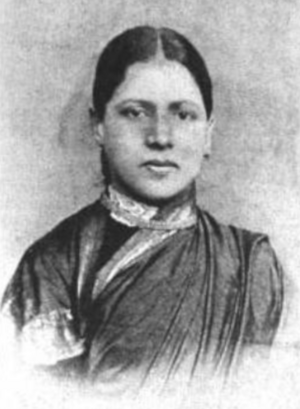Krupabai Satthianadhan facts for kids
Quick facts for kids
Krupabai Satthianadhan
|
|
|---|---|
 |
|
| Born |
Krupabai Khisty
14 February 1862 |
| Died | 8 August 1894 (aged 32) |
| Occupation | Writer |
| Spouse(s) |
Samuel Satthianadhan
(m. 1881) |
Krupabai Satthianadhan (born 1862, died 1894) was an amazing Indian writer. She wrote her books in English. She is remembered for her stories about women's lives in India during her time.
Her Early Years
Krupabai was born on February 14, 1862, in Ahmednagar, India. Her parents, Haripunt and Radhabai Khisty, were Hindu people who had become Christians. Krupabai's father died when she was very young. Her mother and older brother, Bhasker, raised her.
Bhasker was much older and helped Krupabai learn a lot. He lent her books and talked about many important ideas with her. Sadly, he also died young. Krupabai wrote about him in her book, Saguna: A Story of Native Christian Life. This book was partly about her own life.
She also wrote another book called Kamala, A Story of Hindu Life (1894). Both of these books are like "coming-of-age" stories. They show how young people grow up and find their place in the world. In her books, Krupabai wrote about being a girl, about different social groups, and about cultural identity. Both Saguna and Kamala tell stories of women who wanted to learn and read. This was often seen as unusual for women at that time.
Studying Medicine
Krupabai was very sad after her brother Bhasker died. Two European missionary women helped her with her education. This was her first close experience with British people. Her book Saguna shows that this was a mix of good and challenging times.
Later, she went to a boarding school in the city of Bombay. There, she met an American woman doctor. This doctor made Krupabai interested in medicine. Krupabai had learned from her father that helping others was important. She decided that becoming a doctor would let her help other women. She especially wanted to help women who lived in purdah, which meant they stayed mostly indoors and did not meet men outside their family.
By this time, Krupabai's health was not very strong. She won a scholarship to study medicine in England, but she was not allowed to go because of her health. However, the Madras Medical College accepted her in 1878. She lived at the home of Reverend W. T. Satthianadhan, a well-known Christian missionary. Krupabai was a brilliant student. But after a year, she became ill from working too hard. She had to go back to her sister in Pune in 1879 to get better.
Her Teaching Career
A year later, Krupabai returned to Madras. There, she became friends with Samuel Satthianadhan, the Reverend's son. In 1881, Samuel and Krupabai got married. Soon after, Samuel became the Headmaster of Breeks Memorial School in Ootacamund.
In Ootacamund, Krupabai started a school for Muslim girls. The Church Missionary Society helped her. She also taught in several other girls' schools. Ootacamund was a hill station known for its healthy climate. Krupabai's health stayed fairly good there. She found time and energy to write. She published articles in important magazines under the name "An Indian Lady."
Three years later, Krupabai and Samuel moved to Rajamundry. Krupabai became ill again, so they moved to Kumbakonam. Even though her health changed often, this was a very productive time for her writing. By the time they moved back to Madras for good in 1886, she was ready to start a full novel.
Her book Saguna was published in parts between 1887 and 1888. It appeared in the famous Madras Christian College Magazine. During this time, her only child died before its first birthday. This made her very sad, and she needed help to feel better.
Doctors in Bombay found that she had tuberculosis, a serious illness, and it could not be cured. Knowing she did not have much time, she began writing Kamala. She worked on the book until she died. She only stopped to write a memoir about her father-in-law and an unfinished one about her mother-in-law.
Krupabai Satthianadhan died in Madras on August 8, 1894. Her death was a great loss to those who admired her. A few months later, a scholarship for women was created in her memory at the Madras Medical College. Also, a special medal was given at the University of Madras to the best female student in English. Her books were published and translated into the Tamil language.
Her Books
- Saguna: A Story of Native Christian Life, edited by Chandani Lokugé, (New Delhi: Oxford University Press, 1998).
- Kamala: A Story of Hindu Life, edited by Chandani Lokuge.
 | Tommie Smith |
 | Simone Manuel |
 | Shani Davis |
 | Simone Biles |
 | Alice Coachman |

